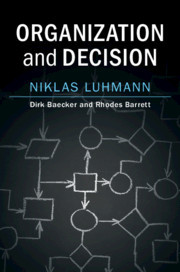Description
Organization and Decision
Author: Luhmann NIklas
Coordinator: Baecker Dirk
Luhmann's classic text on how organizations work; how they should be designed, steered, and controlled; and how they structure society.
Language: English
Subject for Organization and Decision:
Approximative price 41.94 €
In Print (Delivery period: 14 days).
Add to cart
Organization and Decision
Publication date: 11-2018
418 p. · 15.3x22.7 cm · Paperback
Publication date: 11-2018
418 p. · 15.3x22.7 cm · Paperback
Approximative price 120.27 €
In Print (Delivery period: 14 days).
Add to cart
Organization and Decision
Publication date: 11-2018
418 p. · 15.6x23.4 cm · Hardback
Publication date: 11-2018
418 p. · 15.6x23.4 cm · Hardback
Description
/li>Contents
/li>Biography
/li>
Translated into English for the first time, Luhmann's modern classic, Organization and Decision, explores how organizations work; how they should be designed, steered, and controlled; and how they order and structure society. Luhmann argues that organization is order, yet indeterminate. In this book, he shows how this paradox enables organizations to embed themselves within society without losing autonomy. In developing his autopoietic perspective on organizations, Luhmann applies his general theory of social systems by conceptualizing organizations as selfreproducing systems of decision communications. His innovative and interdisciplinary approach to the material (spanning organization studies, management and sociology) is integral to any study of organizations. This new translation, edited by one of the world's leading experts on Luhmann, enables researchers and graduate students across the English-speaking world to access Luhmann's ideas more readily.
1. Organization theory: the classical constructions; 2. Organization as an autopoietic system; 3. Membership and motives; 4. The paradox of decision-making; 5. Time relations ; 6. Uncertainty absorption; 7. Decision premises; 8. Decision programs; 9. Personnel; 10. The organization of organization; 11. Structural change: the poetry of reform and the reality of evolution; 12. Technology; 13. Organization and society; 14. Self-description; 15. Rationality; Conclusion: theory and practice.
Niklas Luhmann (1927–1998) ranks as one of the most important German social theorists of the twentieth century. His works have been highly influential in sociology and other social sciences, including organization studies. The significance of organizations for Luhmann can be traced in his biography: at the beginning of his career, he spent almost eight years as a legal expert in public administration, through which he gained professional expertise in the function of organizations. This practice inspired much of his later theoretical work at Harvard's Graduate School for Public Administration, the University for Public Administration at Speyer, the Center for Social Research in Dortmund, where he was head of department, and at the Department for Sociology at Bielefeld University, where he largely refrained from administrative work. This book, which was one of Luhmann's last, can be regarded as his conclusion to over thiry years of research on organized social systems.
Dirk Baecker is a Full Professor of Sociology at Witten/Herdecke University in Germany. He is one of the leading experts on Niklas Luhmann's work and has previously edited several translations of Luhmann's books, including Social Systems (1996), Theory of Society (2012), and Introduction to Systems Theory (2012).
Dirk Baecker is a Full Professor of Sociology at Witten/Herdecke University in Germany. He is one of the leading experts on Niklas Luhmann's work and has previously edited several translations of Luhmann's books, including Social Systems (1996), Theory of Society (2012), and Introduction to Systems Theory (2012).
© 2024 LAVOISIER S.A.S.




